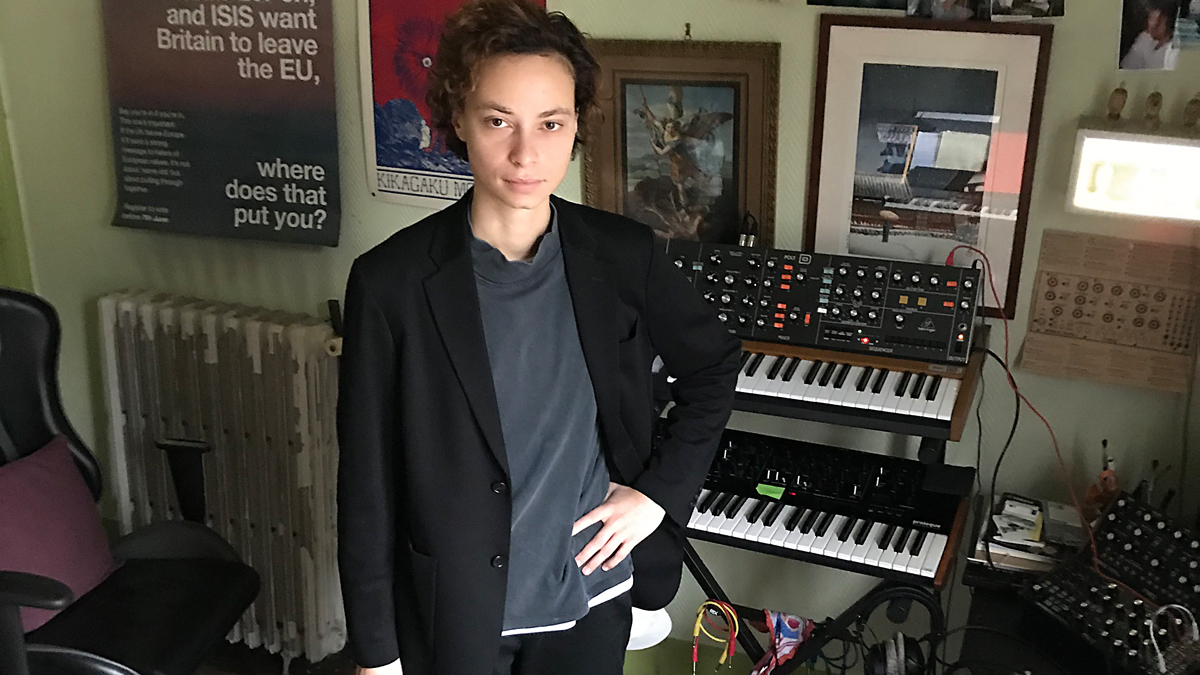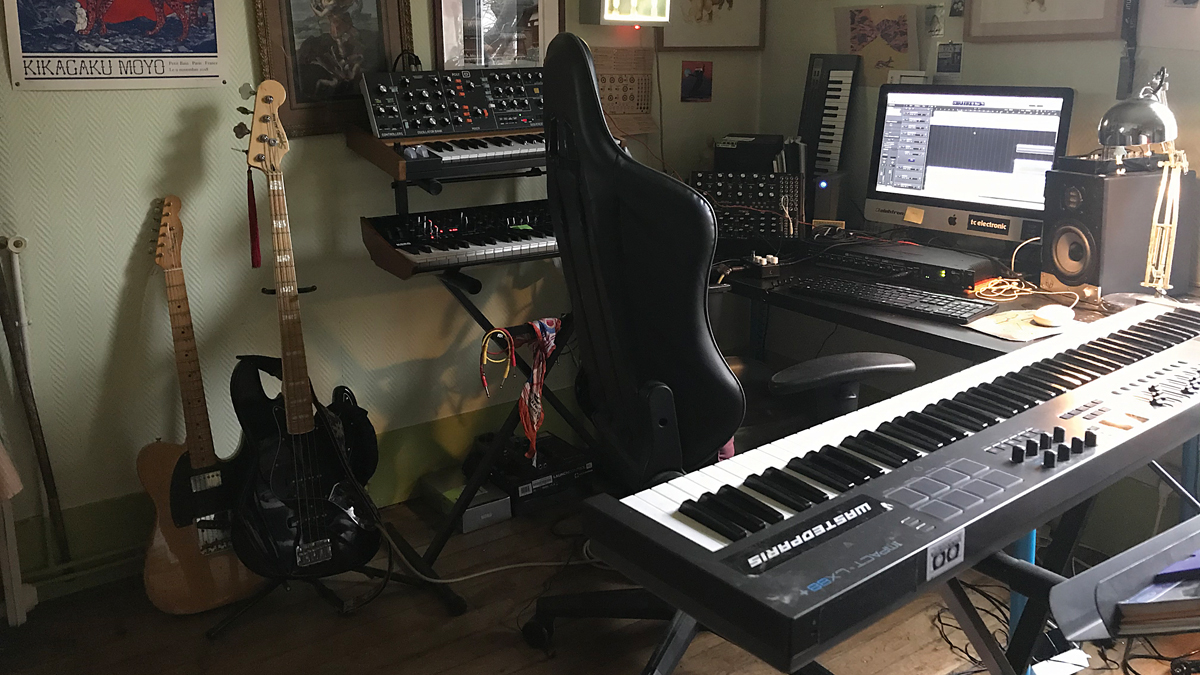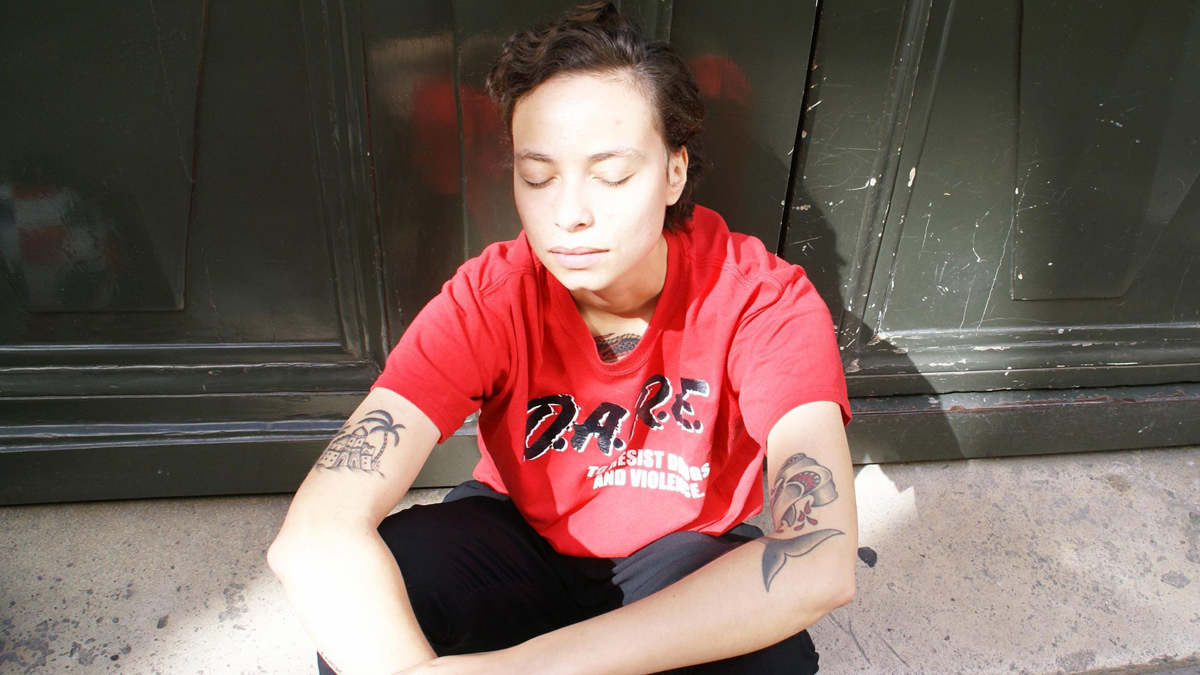Uèle Lamore: “I still use the same refurbished iMac that I got in 2011… I don’t use any soft synths”
The Franco-American composer is bringing together orchestras and electronics, and wonders if AI will take us into a musical future…

Want all the hottest music and gear news, reviews, deals, features and more, direct to your inbox? Sign up here.
You are now subscribed
Your newsletter sign-up was successful
When Uèle Lamore arrived at Boston’s Berklee College of Music in 2013, she was looking for something a little… different. Bored with rock, jazz and pop, she decided that it was time to experiment. She wanted to hang out with weirdos and push music to its absolute limit. And she found everything she wanted on perhaps the most ‘traditional’ of the celebrated music school’s many courses.
“Out of nowhere, I enrolled on a three-and-a-half-year course in classical composition,” says Lamore. “I was a pretty good guitarist, but I was not what you would call a genius musician, so maybe I was making a big mistake. Was I really smart enough for this course? There were 5000 new students in my year and only 10 of them signed up for classical composition. Ten of the biggest nerds in the world… the sad kids who have no friends.
“I was sitting in a room full of strange characters. We were like the Hufflepuffs in Harry Potter [that is to say, the most nerdy of the school houses in the popular children’s magical epic series - Ed]. And you know what? I found my ideal home! It was fantastic! So refreshing and so welcoming. Yes, the theory side of things was a challenge, but the rest of the time we were making every kind of noise you can imagine. If I smash this glass, what kind of music will it create in my mind? Can I make an instrument out of this noise on my iPhone?
“When I signed up for that course, I wanted to learn about classical composition because that was a big hole in my knowledge. But I came away with something completely different… a secular idea of classical music. What happens if I introduce samplers and synthesizers? Computers and drum machines? What happens if I take the force of an orchestra and bring in all these other ideas and instruments.
“This was my dream. This was what I’d been looking for!”
The 27-year-old Franco-American calls herself a composer, arranger and conductor - all those well-worn classical labels - but a listen to this year’s soon to be released debut album, The Magnificent Day Of Giacomo P, for the !K7 label reveals abstract, electronically-driven moods that have more in common with Scanner, Matthew Herbert or peak-era Warp Records. A mix of field recordings, angry strings, 808s, thrashing guitars, odd time signatures and beautiful melodies, the songs are at once demanding and yet utterly beguiling. And all inspired by the work of Puccini.
Alongside the solo releases, Lamore has collaborated with a hodgepodge of impressive names - Étienne Daho, Max Cooper, The Heritage Orchestra, the soundtrack for Aïssa Maïga’s recent film, Walking on Water - not to mention her roles as the founder of L’Orchestre Orage and associate conductor/arranger for the London Contemporary Orchestra.
Want all the hottest music and gear news, reviews, deals, features and more, direct to your inbox? Sign up here.
Like many of our musical interviewees, Lamore would normally spend most of her time travelling, but, unsurprisingly enough, she has been more or less confined to her hometown, Paris, for the last 12 months. And that’s where we found her early in the new year. In the studio, mulling over bits of hardware and trying unsuccessfully to quit smoking…
So, which is easier? Finding your way around the Poly D or giving up the cigs?
“Ha ha! Trying to quit smoking is the hardest thing in the world. I am drinking my first coffee of the morning and my body is crying out for a cigarette. That is why I always schedule interviews in the morning, so it keeps my mind occupied. But now I am already thinking about smoking! My brain is going crazy.”
Writing for an orchestra is a bit like writing for a bunch of different synths. You need to understand each instrument.
Let’s get back to music, then. You studied at both Berklee and the Musicians Institute in Los Angeles… impressive names to include on anyone’s CV?
“Yes, but, like I said before, I was not a musical prodigy. I knew my stuff and I understood music, but I came across hundreds of musicians who were much better than me. I suppose that’s one of the reasons I wanted to study composition.
“Yes, the composition course gave me extra knowledge, but it wasn’t quite how I expected it to be. Number one, it gave me the idea of looking beyond the orchestra. But, at the same time, it also gave me a sense of… discipline. Layers, structure. A regimented framework. Work inside this area. Here is a piece of music; try and create your version of it. Today, I work in a totally different way, but it was great training for me.
“A lot of the course was about listening. This week, we’ll listen to the great Russian composers. Now, let’s listen to the huge orchestral pieces. Why is this section played on the oboe instead of the bassoon? This small cornet part may not seem so important, but it is supercritical. Without it, everything else you can hear would fall apart. Then we got to the contemporary classical composers and I sat there wondering if I was going to lose my mind. So much craziness! Taking the idea of music to another place.
“Writing for an orchestra is a bit like writing for a bunch of different synths. You need to understand each instrument. What’s the best way to use what each one can offer?”
For instance, you probably wouldn’t use a 303 for pad sounds. Having said that, it’d be interesting to hear what that sounded like!
“Of course, there are always the times when you will use an instrument for something that it’s not designed for. Music would be very boring if no one did anything that was out of the ordinary. But you also need to make the best of each instrument… how do you make that instrument shine.”

Did learning how to write for an orchestra make you feel that your music had to be a little more complex?
“If anything, it made me go the other way. When I used to write on guitar, I would always start with a chord progression. That might be seven, eight, 12 chords… who knows. And I might try to make them very complex chords. Trying to fit too much into the song.
“Today, I always start with a melody and then work out what chords will fit over that. If the chord pattern is a simple A-G-A-G-A-G all the way to the end, that’s OK. If it’s just a low A with a raging beat over the top of it, that’s OK, too. Trying to write complex songs for the sake of complexity is a recipe for disaster.”
“Last year, I began working with Sony CSL, helping them to create plugins. We were trying to find out if you really can train a computer to play music like a human. What was the answer? I’m not so sure it’s possible. If you watch someone playing the cello, there is so much happening… the way they breathe and move with the music. The computer wants to play everything perfectly, but the music I make isn’t perfect. The human will always add something of their own. It might be very small, but humanisation is an important part of music.
“I suppose it’s a bit like when drum machines first appeared. Everybody said, ‘Now we don’t have to hire a drummer’. That never happened. Drum machines just created a new sound and new types of music. I think the same will happen with AI. Rather than trying to replace human input, why don’t we push them to do something that is new… something different? That would be far more interesting!”
Was the Berklee course the first time you’d come across electronic music - the idea of mixing drum machines and synths with organic sound?
“Not at all. My brother introduced me to electronic music when I was a kid. He was listening to a lot of hip-hop from the early ‘90s, through to the early ‘00s. So many great producers and artists like Dr Dre and Kanye West. A lot of fresh beats, vocals with Auto-Tune, using acoustic instruments and old school synths. That was when my musical vision first began to change.
“To tell the whole story, I need to go back to when I was, like, three or four. My parents bought me a violin and sent me to these classical classes for little kids. Basically, you go there and you make a lot of noise, but I hated it, so they got me a guitar. This was perfect timing for me, because all the indie rock acts were coming over to France. I listened to a lot of Arctic Monkeys and joined a couple of bands at school. Rock was my thing.
“I was a pretty good guitarist, but, when it came to the theory of music, I never really understood what I was playing. We were not a musical family, so that was never something that came to me naturally. But - and this is where I was very lucky - I understood the machinery that sat underneath the music. I could listen to a song and work out how the drums and the keyboards help each other. I understood how the bassline fits in with the guitar and the vocals.
“For me, it was like the engine of a car. You need this bit and this bit to work with this and this. When everything is doing its job, the whole thing can go forward. Each individual bit of metal exists as part of something that is much bigger. At a certain point in a song, the drums drop out and everything is focussed on the melody. Then the drums come back in. Why choose that particular point to bring them back? Like parts of the engine, all these different musical elements give the song its energy and keep it moving forward.
“The only way I could learn those tricks for myself was by trying to learn about production. And the only way I could do that was by getting a computer and a DAW.”
Which DAW?
“I did a bunch of part-time jobs and managed to save up enough for a refurbished iMac. Then, I decided to get Pro Tools because… well, I have no idea how I ended up with Pro Tools. Maybe it was something as crazy as me searching on Google. ‘What do you need to be a music producer?’ I saw the name Pro Tools, so I figured that’s what everyone used.
“It was a nightmare. I was just staring at the screen for weeks… everything seemed so difficult. Luckily, I found a teacher who came to my house for a DAW class. This guy introduced me to the basics and then gave me the best bit of advice. ‘If you get stuck, look on the internet.’ It was true then and, to a certain extent, it’s still true today. Most of the time, you can find the answer out there somewhere. And the great thing about this approach is that it made me very independent. I wasn’t afraid of not being surrounded by a live band. In fact, I didn’t need a band at all… I had access to all these different plugins and synths. The music I was making came from a different place in my imagination.
“I’m not saying it was easy. It was a long process, and I spent a lot of time on YouTube. Ha ha! YouTube was my guru. I was still writing on the guitar back then and the only way I could get my songs inside the computer was to write down all the notes from the guitar chords and program them in MIDI. Maybe that’s why I moved away from chord-based writing. More and more, I felt that the most important part of the song was the melody. The little earworm that allows a song to take control of your head. Get the right melody and everything else will fall into place.
“When I listen back to those early songs, I find it difficult because they’re so messy. At that age, your brain is like a sponge. You hear all the different music and try to fit everything into one song. A hundred ideas in three minutes. That’s what I meant about the classical composition course giving me structure and boundaries. I stopped trying to fit every idea and every little bit of inspiration into every song.”

In recent interviews, you’ve talked about geography and place being some of the main inspirations behind your music.
“Definitely! The EP I released last year, Tracks, was an exploration of travel… of course, this was before we knew we would be in lockdown for so long. How does a particular moment in a particular place make you feel? Drifting through cities that you’ve never visited before. How unfamiliarity can make you feel lost and alone.
“One of the songs on Tracks is called Jūjō Station, and its name comes from Jūjō subway station in Kyoto. The system over there is wonderful because each different subway line has its own melody. It’s not like the usual situation where you hear a distorted voice shouting, ‘Get on this train if you want to go somewhere’. These melodies are really cute. I ended up recording loads of stuff on my iPhone. Those melodies, the sound of people talking, the sound of trains. I wanted to create an audio picture that I could take back to Paris.
“When I did get back into the studio, I started listening to the recordings and tried to work out if I could use any of them in the song. But I also started looking for new sounds that would remind me of the time I spent there. Sounds that were reminiscent of the life I observed in Kyoto.
Trying to write complex songs for the sake of complexity is a recipe for disaster.
“Outside of Tokyo, Japan is all about cash. No one uses a card; everyone pays with cash. I remember standing on Jūjō station platform with no money, just my credit cards, wondering how I could buy a ticket. The clerk of the station had been watching me on the security cameras and eventually came to help me. At that moment, I felt a long way from home.”
What’s your main kit in the studio?
“I still use the same refurbished iMac that I got in 2011. The difference is that it now needs a 2TB external hard drive for all the plugins. And I run Logic Pro instead of Pro Tools. There’s a Korg Prologue, my Behringer Poly D, a Korg Volca Keys… I love Korg gear. A couple of guitars, my Fender Squire bass that cost me 200 bucks. The rest is inside the computer.”
Lots of soft synths and production tools?
“No, just Spitfire Audio sample libraries. I guess it kind of helps that I am sponsored by Spitfire! All the main orchestra libraries, plus their Labs series of free libraries. There is some super-cool stuff on there. If I need a synth part, I use one of my real synths.”
Or the Logic synths?
“No, I don’t use any soft synths. I have some fantastic hardware synths sitting right in front of me, so I might as well use them. It’s the same thing with effects. My engineer has a great studio with lots of quality hardware, so it makes sense to use it. Not because we’re analogue freaks. We just like the sound of hardware because… it’s warmer.
“Being completely honest, I’m not very proficient with that side of the studio. I just make it up as I go along. Maybe that’s a good thing because I use the studio in ways that aren’t supposed to work. I put my guitar delay pedal on the drums. I put compressors on top of compressors. I guess you could say I’m trying to create my own sound.
“The only problem is that when I take the song to my engineer, he always looks at me with a sad face. ‘Uèle, what have you done? These delays are crazy and you’ve got everything compressed to the maximum.’ I just smile at him. ‘Yeah… doesn’t it sound cool?!’”
Uèle Lamore's EP, Tracks, is out now.


Computer Music magazine is the world’s best selling publication dedicated solely to making great music with your Mac or PC computer. Each issue it brings its lucky readers the best in cutting-edge tutorials, need-to-know, expert software reviews and even all the tools you actually need to make great music today, courtesy of our legendary CM Plugin Suite.
